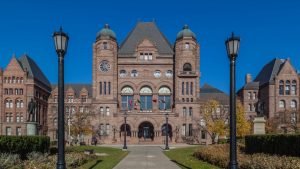Count economist Benjamin Tal among those who do not see a housing crash in Canada in the near future.
Tal, the deputy chief economist at CIBC, also suggested during a recent speech to engineers that the world’s producers are showing signs of coming to grips with the global supply chain problem, praised the Bank of Canada for showing restraint on its latest interest rate hike and gave a thumbs-up to a recent housing expansion plan introduced by Ontario’s Doug Ford government.
The economist was the morning keynote speaker on the second day of the Association of Consulting Engineering Companies — Canada national leadership conference held Nov. 1 to 3 in Ottawa. His session, moderated by Jeff Lutzak, partner at RSM Canada, was billed as Canada’s Economy: Where We Are Today and Where We Will Be.
Tal offered his analysis of the last two years of Canada’s extraordinary housing market.
“The housing market was on fire. We are talking about what, a 46-per-cent increase in two years? That’s madness,” he said of late 2020 into early 2022.
What happened was that early in the pandemic, most of those who lost their jobs were low wage earners.
“But homebuyers, traditional homebuyers, their job was there, their position was there, their income was there, and interest rates were in the basement,” Tal said.
“If you think about it for a second, homebuyers during COVID got the benefit of a recession, with a significant decline in interest rates, without the cost of a recession.”
He has never seen anything like it, Tal said, the sense of urgency to get into the housing market during that period.
Seen in retrospect, those purchases can be considered front-loaded activity.
“We borrowed activity from the future,” Tal said, and now, amidst spiking interest rates, housing prices in the GTA have gone down 19 per cent since their February 2022 peak and further drops are projected into next spring.
Said Tal, “The future has arrived. This is not a crash. This is not a meltdown. This is basically reallocation of activity over time.”
Tal noted he was speaking just about the same time as Canada’s Minister of Immigration Sean Fraser was announcing an expansion of immigration quotas for the next three years, reaching 500,000 in 2025. Negotiations will ensue to determine how many from the enhanced economic-immigrants category will be skilled construction workers.
The need for more skilled workers in that stream is desperate, Tal said, noting 400,000 immigrants were welcomed to Canada last year.
“How many construction workers did we get out of those 400,000? Zero,” he said.
But “overall it’s a very positive story,” said Tal, “We got six times more immigrants than the U.S. and that’s one of the reasons why our labour market is better supplied than others.”
Rising costs in the construction sector are having a major impact on project investments, Tal said, with numerous reports of delays and outright cancellations.
“There are three sources of inflation: supply-chain-driven inflation, demand-driven inflation, and we-don’t-know inflation,” Tal said. “Supply chain is 50 per cent of inflation. You remove supply chain from the story, we remove 50 per cent of inflation.”
And that appears to be happening, Tal said — logistics are improving, freight is booming, and even the number of truck drivers in the U.S. has escalated 20 per cent since before the pandemic.
Assessing recent actions of the Bank of Canada, Tal said the move to raise interest rates only 50 basis points in late October signalled that in future Governor Tiff Macklem would move moderately in attempting to tame inflation, cognizant of the need not to sabotage the economy.
The bank is saying, “We don’t want to overshoot,” said Tal.
“You can pray that the Bank of Canada will stop at 4, 4.5 per cent. That’s our forecast. Then keep interest rates relatively stable for a year and then start cutting.”
Federal fiscal policy must be aligned with the Bank of Canada, Tal said.
Otherwise, “It’s like putting a humidifier and a dehumidifier in the same room and seeing who wins.”
Tal also had positive words for Ford’s new housing plan, contained in the More Homes Built Faster Act unveiled Oct. 25. The act would streamline approvals, relax zoning regulations and cut development fees among other reforms.
“It’s the most significant housing policy change in many, many years,” said Tal.
Follow the author on Twitter @DonWall_DCN.












Recent Comments
comments for this post are closed